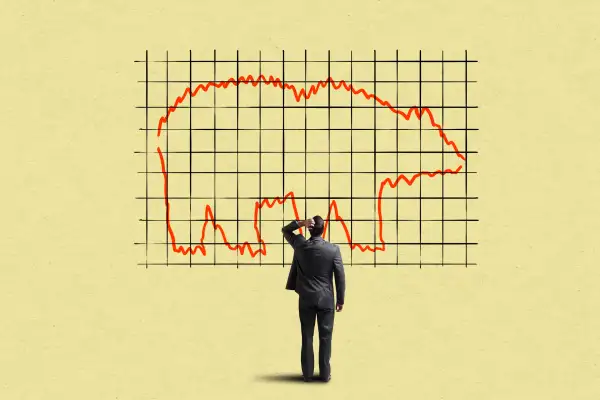Bear Market Fears: Here's When Stocks Usually Bounce Back After a Downturn
Money is not a client of any investment adviser featured on this page. The information provided on this page is for educational purposes only and is not intended as investment advice. Money does not offer advisory services.

Market downturns can be scary for investors. But here's what to keep in mind to alleviate some of that anxiety: They don't last forever.
If you've been following news around the stock market recently, you've likely heard a lot about a "bear market." The term refers to a prolonged market downturn that consists of a drop of at least 20% in prices from recent highs.
When investors talk about a bear market, they're typically talking about a broader index like the S&P 500 or the Dow Jones Industrial Average, which are common benchmarks used to measure how stocks are doing overall.
Stocks have experienced a major selloff in recent weeks amid the Federal Reserve hiking interest rates to battle high inflation. The S&P 500, which is down 18% for the year, entered bear market territory during trading on Friday, before recovering. Meanwhile, the Dow Jones Industrial Average is down around 13% from the beginning of 2022, and the Nasdaq Composite is down nearly 29%.
Bear markets are "natural occurrences in the stock market," Sam Stovall, chief investment strategist at CFRA Research, recently told Money. But if you own stocks, market downturns probably still make you uneasy.
Here's how long bear markets typically last, and how long it takes stocks to recover.
As to be expected, not all bear markets are the same.
In 1957, it took just one day after the a bear market started for the S&P 500 to hit the bottom, according to an LPL Research analysis of FactSet data. But in the early 2000s, it took 19 months for stock prices to stop falling after the bear market started.
One factor that seems to make a pretty big difference when it comes to how long stocks keep falling is whether or not there is a recession — a period of economic downturn commonly defined by two quarters of declining gross domestic product (GDP) — around the bear market. Looking at the data from 1950 until today, if a bear market was accompanied by a recession, the weakness in stocks usually continued longer, LPL Research found.
Economic experts are pretty split on whether or not we'll see a recession this year, but here's a bright spot to a bear market:
“As rough as bear markets are, the good news is the future returns really improve once stocks are down 20%,” Ryan Detrick, chief market strategist at LPL Financial, said via a blog post accompanying the analysis. “In fact, a median gain of nearly 24% a year after a bear market starts may help some beaten-down bulls confidently stay the course.”
On average, it took about 19 months for stocks to recover their losses from a bear market or near bear market, according to the analysis. But for the last three bear (or near bear) markets in 2011, 2018 and 2020, it took stocks just four to five months to make up the losses.
The worse a bear market is, the longer it takes to recover, LPL Research found. For example, when a bear market decline was less than 22%, it took just seven months on average to recover, but when a bear market decline was more than 22%, it took an average of 27 months.
If you're wondering what actions you should take with the prospect of a bear market, it's important to understand that the stock market's best days also tend to occur right around its worst days. Because it's impossible to predict which days stocks will rise or fall, your best strategy is likely to stay the course and not do much at all.
More from Money:
Why Keeping Your Money in the Stock Market Is Especially Important Right Now
4 Investing Moves to Make Instead of Panicking About Volatile Markets
